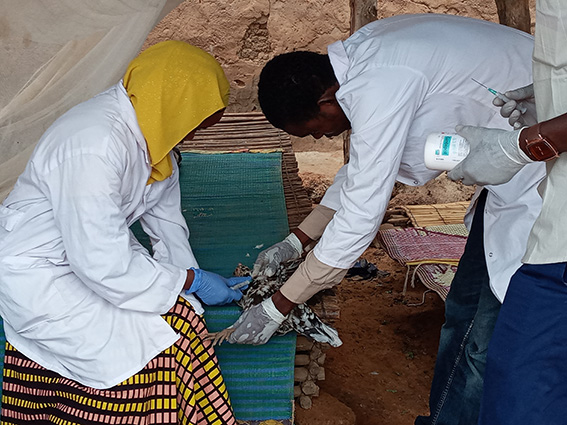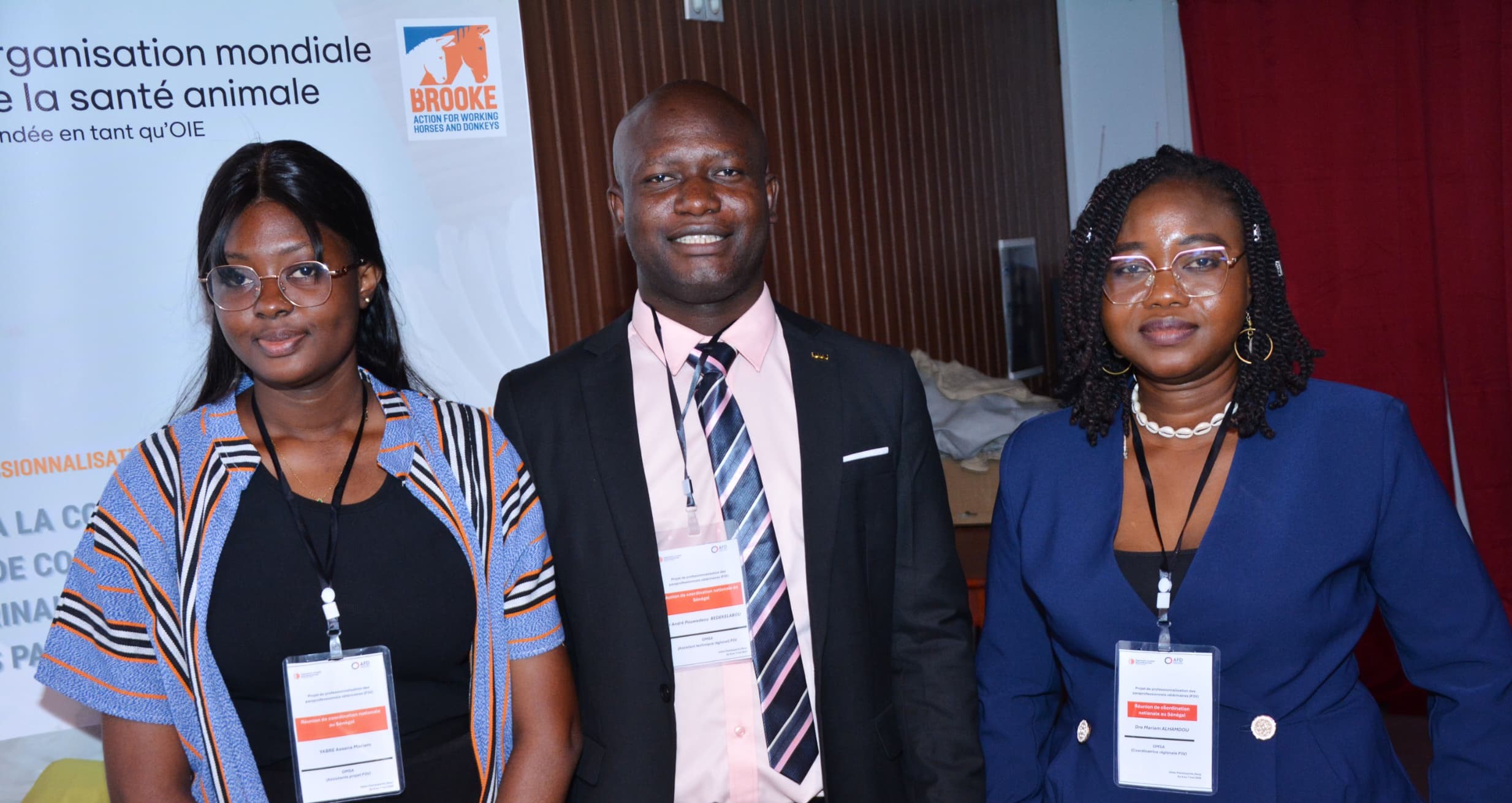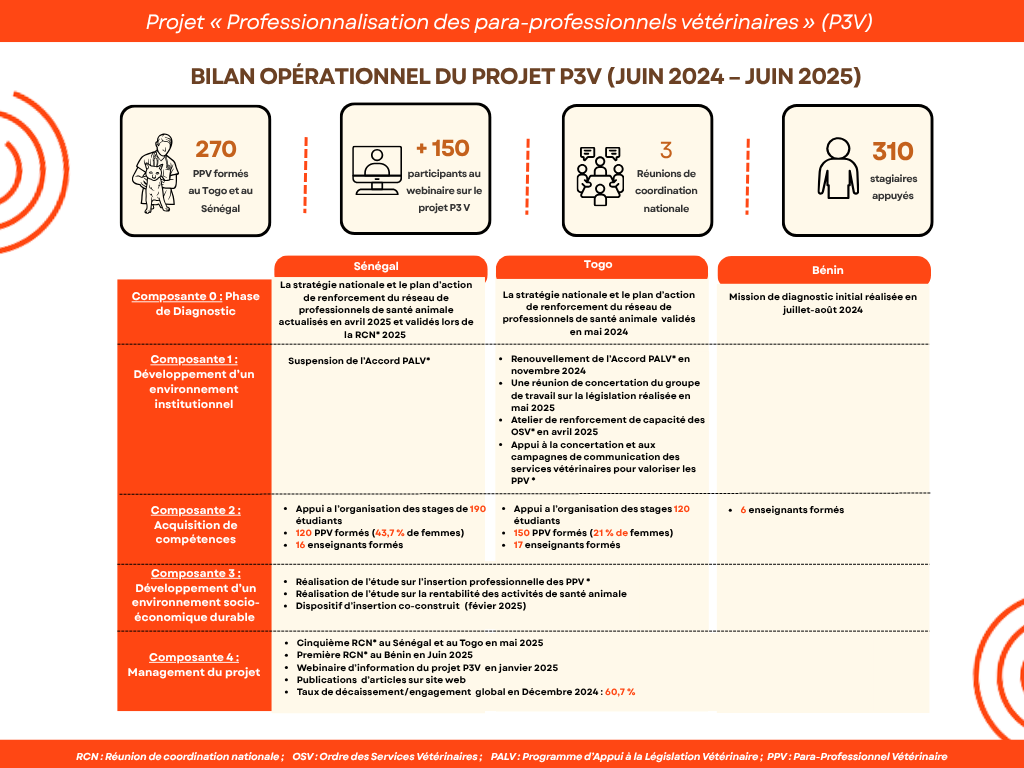
Since 2020, the Professionalization of Veterinary Paraprofessionals (P3V) project, implemented by WOAH with the support of the French Development Agency (AFD), has been helping three West African countries (Senegal, Togo and recently Benin) to better structure their Veterinary Services.
Based on five complementary components, the Project aims to professionalise the VPPs, improve their integration, strengthen the institutional environment and facilitate farmers’ access to quality services.
In this dynamic, national coordination meetings play an essential role. They provide a framework for exchanges between stakeholders, a space for technical monitoring, but also a strategic lever for capitalising on achievements, validating the tools developed and considering prospects for sustainability.
As part of this initiative, the P3V Project organised three national coordination meetings between May and June 2025. These were held consecutively in Senegal (6 and 7 May in Saly Portudal), Togo (22 and 23 May in Lomé) and Benin (4 June in Bohicon). These meetings brought together the main stakeholders in the animal health sector: ministries, veterinary services, training institutions for veterinary paraprofessionals, professionals, and technical and financial partners for a moment of dialogue and mobilisation around the future of VPPs.
The national coordination meetings began with a general presentation of the activities carried out in each country over the past year. This report, prepared by the P3V Project team, provided an update on the progress of the project, highlighting achievements, difficulties encountered, and lessons learned from its implementation. It also highlighted the collaborative efforts between the various stakeholders involved in the project, including government ministries, training institutions, professional organisations and technical partners.
In Benin, the teams presented the first steps taken since the country joined the Project in 2024. In particular, they shared the actions taken to select pilot schools, train an initial core group of teachers, and mobilise stakeholders around strategic priorities. This first national coordination meeting was an important step in the process of national ownership and structuring of the Project.
The presentations also highlighted several key areas of work.
In Senegal and Togo, particular emphasis has been placed on ongoing studies focusing respectively on the professional integration of VPPs and the economic profitability of their activities. This work, carried out in collaboration with partner institutions, aims to better understand the integration trajectories, success factors and barriers to the establishment of young professionals. It informs reflection on support policies, the adaptation of training programmes and the implementation of sustainable post-training support mechanisms.
Finally, the meeting held in Benin featured a detailed presentation on PVS missions and curriculum reviews. This presentation explained the rationale and methodology behind this training programme evaluation process, which aims to align national VPP curricula with international standards while taking into account the specific circumstances of each country.
Two major themes structured the collective discussions during the meetings: the digitisation of the Manual for Animal Health Personnel (MUPSA) and the transferability and sustainability of the tools developed as part of the Project. These workshops enabled collective intelligence to be mobilised around the conditions for sustaining the P3V Project, taking into account the achievements, the challenges still to be overcome and the specific contextual characteristics of each country.
With regard to the digitisation of MUPSA, participants unanimously welcomed this innovative initiative, which is seen as an essential lever for democratising access to veterinary information. However, they highlighted several requirements to ensure its effectiveness: an intuitive platform that is compatible with mobile phones, accessible offline and designed to meet the realities of rural areas. The diversity of user profiles, including veterinarians, VPPs, teachers, learners and community workers, was taken into account in the discussions, as were linguistic needs and varying levels of literacy. It was strongly recommended that an educational approach be adopted, including clear texts, explanatory videos, interactive quizzes, infographics and audio materials. The challenge is to design a tool that is accessible, engaging and useful for learning, professional practice and continuing education.
Discussions also focused on the governance of this platform: beyond the technical aspects, participants emphasised the need to make it an institutionalised tool, managed and regularly updated by national stakeholders, with the support of technical partners. All expectations expressed during the discussions, insofar as they are feasible and comply with ethical principles, will be taken into account in the specifications sent to the consultant in charge of developing the platform, with a view to making it an effective, inclusive and sustainable tool.
The second theme focused on the transferability and sustainability of the Project’s tools. The groups highlighted a satisfactory level of ownership, particularly with regard to training frameworks, professional integration mechanisms for VPPs, consultation frameworks, and economic models developed to support the settlement of VPPs. These tools are now used in several institutions, but their long-term sustainability depends on several factors: institutional recognition, integration into public policies, and the mobilisation of human and financial resources.
Discussions thus converged on a number of key recommendations: integrating the tools into national action plans, training national representatives capable of ensuring continuity, creating formal post-training follow-up mechanisms, and encouraging public or mixed financing to support the measures over the long term. Participants emphasised the importance of a shared strategic vision among ministries, training institutions, professional bodies and development partners in order to move from the experimental phase to a national and sustainable dynamic.
This group work has therefore laid the foundations for a promising post-P3V future, consolidating achievements, opening up prospects for expansion, and affirming the common desire to build a more inclusive, efficient and resilient veterinary system.
The fifth national coordination meetings of the P3V Project marked an important strategic milestone. They enhanced transparency, highlighted results and promoted a shared vision of the project. Discussions provided an opportunity to review national progress, identify common challenges and consider sustainable solutions, particularly through digital innovation. The mobilisation of stakeholders around the professionalisation of VPPs, the strengthening of local veterinary services and local capacities was welcomed. The recommendations from these meetings will lay the foundations for the next steps, calling for a collective commitment to improve the working conditions of VPPs at the service of livestock farmers and animal health in West Africa.






